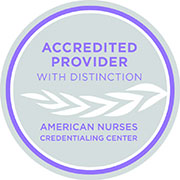Nurses:
 Nurses may receive 6 contact hours upon successful completion of this educational activity. Successful completion of this activity for Continuing Education (CE) requires attending the entire activity, completion of the online CE evaluation, and completion of the verification of attendance form provided on site. Partial credit is not provided. Participants receive a CE certificate via email from the University of Maryland School of Nursing approximately 2-4 weeks after submitting their request and required documentation. All requests must be received within 30 days of the conference.
Nurses may receive 6 contact hours upon successful completion of this educational activity. Successful completion of this activity for Continuing Education (CE) requires attending the entire activity, completion of the online CE evaluation, and completion of the verification of attendance form provided on site. Partial credit is not provided. Participants receive a CE certificate via email from the University of Maryland School of Nursing approximately 2-4 weeks after submitting their request and required documentation. All requests must be received within 30 days of the conference.
The University of Maryland School of Nursing is accredited as a provider of continuing nursing education by the American Nurses Credentialing Center’s Commission on Accreditation.
Physicians: CME Accreditation
 This activity has been planned and implemented in accordance with the accreditation requirements and policies of the Accreditation Council for Continuing Medical Education (ACCME) through the joint providership of the University of Maryland School of Medicine and the Institute for Jewish Continuity. The University of Maryland School of Medicine is accredited by the ACCME to provide continuing medical education for physicians.
This activity has been planned and implemented in accordance with the accreditation requirements and policies of the Accreditation Council for Continuing Medical Education (ACCME) through the joint providership of the University of Maryland School of Medicine and the Institute for Jewish Continuity. The University of Maryland School of Medicine is accredited by the ACCME to provide continuing medical education for physicians.
Credit Designation: The University of Maryland School of Medicine designates this Live activity for a maximum of 6.0 AMA PRA Category 1 Credits™. Physicians should claim only the credit commensurate with the extent of their participation in the activity.
Social Work:
The University of Maryland School of Social Work Office of Continuing Professional Education is authorized by the Board of Social Work Examiners in Maryland to sponsor social work continuing education programs and maintains full responsibility for this program. This training qualifies for 5.25 Category I continuing education units (the Self- Care Immersion is not included.) Successful completion of this activity requires your signature on the sign-in sheet, participation in the entire activity, and completion of an evaluation form that is handed in at the end of the activity. This conference does not meet the Maryland Board of Social Work’s ethical requirement.
Pharmacy:
The University of Maryland School of Pharmacy is accredited by the Accreditation Council for Pharmacy Education as a provider of continuing pharmacy education. This application-based activity (UAN: 0025-0000-18-113-L04-P) is approved for 6.0 hours (0.6 CEU) of continuing education credit. Statements of credit will be posted to CPE Monitor within three weeks for all participants who successfully complete the activity. Successful completion of this activity requires your signature on the sign-in sheet, participation in the entire activity, and completion of an online activity evaluation.

 Nurses may receive 6 contact hours upon successful completion of this educational activity. Successful completion of this activity for Continuing Education (CE) requires attending the entire activity, completion of the online CE evaluation, and completion of the verification of attendance form provided on site. Partial credit is not provided. Participants receive a CE certificate via email from the University of Maryland School of Nursing approximately 2-4 weeks after submitting their request and required documentation. All requests must be received within 30 days of the conference.
Nurses may receive 6 contact hours upon successful completion of this educational activity. Successful completion of this activity for Continuing Education (CE) requires attending the entire activity, completion of the online CE evaluation, and completion of the verification of attendance form provided on site. Partial credit is not provided. Participants receive a CE certificate via email from the University of Maryland School of Nursing approximately 2-4 weeks after submitting their request and required documentation. All requests must be received within 30 days of the conference. This activity has been planned and implemented in accordance with the accreditation requirements and policies of the Accreditation Council for Continuing Medical Education (ACCME) through the joint providership of the University of Maryland School of Medicine and the Institute for Jewish Continuity. The University of Maryland School of Medicine is accredited by the ACCME to provide continuing medical education for physicians.
This activity has been planned and implemented in accordance with the accreditation requirements and policies of the Accreditation Council for Continuing Medical Education (ACCME) through the joint providership of the University of Maryland School of Medicine and the Institute for Jewish Continuity. The University of Maryland School of Medicine is accredited by the ACCME to provide continuing medical education for physicians.